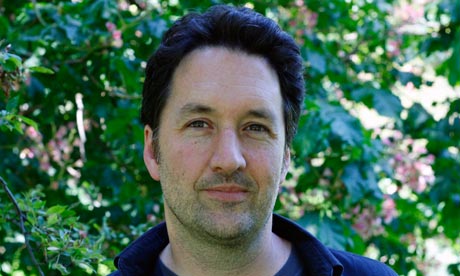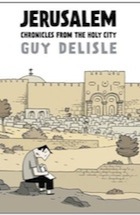Veteran graphic novelist Guy Delisle talks to Rachel Cooke of The Guardian about his acclaimed travelogues and the art of telling a tale at street level
 |
| Guy Delisle in Regent's Park, London. Photograph: Sophia Evans for the Observer New Review |
When Guy Delisle arrived in Israel in 2009, he thought: a year here will make a change from our usual third-world destinations. He and his family – his wife, Nadege, an administrator with Médecins Sans Frontières (MSF); his children, five-year-old Louis and two-year-old Alice – gazed at Ben Gurion airport's modern terminal with anticipatory awe. But then he saw east Jerusalem, where MSF stationed its employees, and he began to wonder. The non-existent pavements, the cratered roads, the piles of rubbish... his new home sure didn't look like the travel guides.
Day one in this strange new land saw Delisle going out to buy disposable nappies. Except it was a Friday; everywhere in Arab east Jerusalem was closed. His only option was to use the supermarket in a nearby Israeli settlement. "So the conflict and everyday life were mixed right from the start," he says. "Which was perfect for me. My books are always at pavement level. That's what I do."
Delisle is a comics writer whose books –Shenzhen, Pyongyang, Burma Chronicles – document his travels so vividly that you return to your Rough Guide, your Lonely Planet with a heavy heart. Funny, precise, and unafraid to mention national foibles, Delisle begins his narratives as the baffled outsider: the galumphing expat who must cope with all the boring logistics of life, from finding a playground for his children to predicting the vagaries of the bus service. Once embedded, though, he moves carefully beyond all this quotidian stuff. He meets people and asks them questions, some basic, some tricky. He goes on day trips, albeit not necessarily to the tourist places. The blinds roll up. Places that seem fuzzy and complicated – or, in the case of Pyongyang, completely invisible – appear before you, clear and bright.
His new book, Jerusalem: Chronicles from the Holy City, won the main prize at the 2012 Angoulême International Comics festival (the graphic novel equivalent of the Palme d'Or) and has already sold 110,000 copies in France alone. And no wonder. The bar is set extremely high when it comes to graphic books and the Middle East: one thinks of Joe Sacco's Palestine, Rutu Modan's Exit Wounds, Marjane Satrapi's Persepolis. But Jerusalem, I think, beats them all.
Given the millstone of history, you could have forgiven Delisle for flunking this one. Yet his book is a small miracle: concise, even-handed, highly particular. Within its pages, you will find the settlements and the "security" wall. But you will also witness the one night of the year when the Haredim get paralytically drunk; meet the priest who keeps a collection of horror films at his church on the Mount of Olives; and find out what happens when Delisle shows Nablus art students scenes from one of his old strips.
The book, like Burma Chronicles, was written at home in Montpellier, after the family's 12-month posting was up (Delisle is a Quebecois; his wife is French). "Out there, my head was full. I wondered where I would ever start. Back at home, I waited for two months, I read back all my notes, looked at all my sketches and then I did as I always do.
"The challenge is not to explain too much. I didn't want to write about the Yom Kippur war or whatever. I love comics because they are so efficient. If I need to draw a little arrow, or a map, then I do. If you did those things in a documentary, it would look like a Power Point presentation. But in a comic, it's fine. I can explain the entire history of the Temple Mount in three pages!" On a settler-organised tour to Hebron, Delisle counters a piece of misinformation not with long-winded arguments, but simply by drawing the look he flashes at his companion. One frame is all he needs.
Does he rearrange things, the better to improve his narrative? The book begins with a touching scene in which a Holocaust survivor – Delisle sees the camp tattoo on his arm – plays with Alice on their flight out to Israel, which seems a little neat: a way of establishing sympathy for the Israeli state's beginnings before he says anything else. "No, not at all. The only thing I do is remove the boring stuff." Is the Guy of the books – deadpan, unflustered – a character he has created or is this really him? "No, no, that's me. I do have quite an English sense of humour. I'm stoic. My emotions are way back."
Delisle, who began his working life as an animator, is thrilled to have reached a point where he can make a living from comic books alone (he is translated into 13 languages, though, so far, no one has asked to doJerusalem in Hebrew or Arabic). But this may be the last of his big travelogues. He and Nadege have decided that, for the sake of their children, they must stay in France for the time being. "Don't worry," he says, seeing my face fall. "I have ideas for other books and MSF has asked me if I would like to do reportage for them." And will he? "I don't know. I don't want to look like... a tourist. I like to go deeper. Once, you see, I went to Vietnam. I had a great time, I took lots of notes. But there was no book." He grins. "It's a pity, but fun doesn't necessarily result in a book."


No comments:
Post a Comment